| Saturday, April 16, 2005 |  |
|
|
|

...
[ Inspiration | 2005-04-16 22:58 | | PermaLink ] More >
|
|
| Thursday, April 7, 2005 |  |
|
|
|
 The formerly very isolated kingdom of Bhutan is working on a new constitution. The draft is rather beautiful. It starts out like this: The formerly very isolated kingdom of Bhutan is working on a new constitution. The draft is rather beautiful. It starts out like this:WE, the people of Bhutan:
BLESSED with the luminous benedictions of the Triple Gem, the protection of our guardian deities, the wisdom of our leaders, the everlasting fortunes of the Pelden Drukpa and the command of His Majesty the Druk Gyalpo, Jigme Singye Wangchuck;
SOLEMNLY pledging ourselves to strengthen the sovereignty of Bhutan, to secure the blessings of Liberty, to ensure Justice and Tranquility and to enhance the unity, happiness and well-being of the people for all time; And it goes on to outline a society with freedom of speech and movement, and democracy, equality, peace, social security, free healthcare and education, free access to information, etc. Quite unique, I'm sure, is the repeated reference to happiness. Like:The State shall strive to promote those circumstances that will enable the successful pursuit of Gross National Happiness. I'd vote for that.
The only strange thing about he site, other than that it uses language like "luminous benedictions of the Triple Gem", which I'm not sure what exactly means, is how the people who wrote it seem very worried about copyrights. The draft constitution is copyrighted and all rights reserved by the drafting committee. And they've gone to some length to make it difficult to examine the source of the webpages or to copy the text or the pictures. Which doesn't seem to quite go together with the spirit of that constitution.
[ Inspiration | 2005-04-07 12:49 | | PermaLink ] More >
|
|
| Tuesday, March 22, 2005 |  |
|
|
|
 New Scientist has an article about researchers trying to understand why people often cooperate and do good things, for no self-serving reason they can find. Previously the prevalent theory has been that people do it for their own self-interest, but various experiments show otherwise. Hahah, surprise. People might be good for no good reason. New Scientist has an article about researchers trying to understand why people often cooperate and do good things, for no self-serving reason they can find. Previously the prevalent theory has been that people do it for their own self-interest, but various experiments show otherwise. Hahah, surprise. People might be good for no good reason. Over the past decade, experiments devised by Ernst Fehr of the University of Zurich in Switzerland, among others, have shown that many people will cooperate with others even when it is absolutely clear they have nothing to gain. A capacity for true altruism seems to be a part of human nature. It is a heartening discovery, yet one that has also touched off a firestorm of debate.
The experiments at the centre of the controversy are as simple as they are illuminating. They ignore theory-based preconceptions about how individuals ought to behave and focus instead on finding out what they actually do when playing games in which there is real money at stake.
One of the most basic of these games is the "ultimatum game". An experimenter gives one of two players some cash, say $20, and asks that person, called the "proposer", to offer a fraction of it to the second player, called the "receiver", whose identity is hidden from the other player. The proposer can offer any amount they choose, from nothing up to the entire $20. The receiver then has the choice of accepting or rejecting the offer. If he or she accepts, the cash is shared according to the original offer. A rejection means that no one gets anything. The game is played just once.
For the receiver, self-interest would seem to dictate accepting the offer no matter how small it is, since getting something is better than getting nothing. Knowing this, a similarly self-interested proposer should offer as little as possible. But over the past decade or so, research on student volunteers has shown that proposers in such experiments typically offer anything from 25 to 50 per cent, while receivers tend to reject offers of less than 25 per cent.
"People reject low offers," says anthropologist Joseph Henrich of Emory University in Atlanta, Georgia, "because they view them as unfair." And through their rejection, they show a willingness to punish the unfair offers even at a cost to themselves.
A vast number of other experiments illustrate the same point. Last year, for example, Fehr and his colleagues had students play a version of the famous prisoner's dilemma game, in which two people can prosper through cooperation but are also given strong incentives to cheat on one another. In this game, if the participants cooperate, each receives a worthwhile monetary pay-off. But either player can get an even higher pay-off by cheating while their opponent cooperates (see Diagram).
In this particular version of the game, the researchers got people to play sequentially: one would go and then the other, fully aware of what the first had done. In theory, anyone thinking only of their own personal gain would always cheat, as this pays more than cooperating. But in the experiments, although many of players who went first did cheat, others cooperated, despite knowing that the second player could sucker them by cheating. What's more, roughly half those who went second rewarded cooperation by treating their opponent fairly, even though that meant forgoing an easy pay-off for themselves (Human Nature, vol 13, p 1). "The facts are clear," Fehr says. "Many people are willing to cooperate and to punish those who don't, even when no gain is possible."
"Many people will cooperate, and punish those who don't, even when no gain is possible"
This tendency - which researchers call "strong reciprocity" - throws into question the assumption that apparently selfless behaviour must have some selfish explanation. Across disciplines, researchers now agree that people often act against their own self-interest. "This is the most important empirical work on the human sense of justice in many years," says evolutionary biologist Robert Trivers of Rutgers University in New Jersey. Well, there's hope for humanity. I don't find their findings in any way surprising. It doesn't either have the be an either-or proposition whether it is enlightened self-interest or not. It all depends on how big you feel your operating sphere is. Cooperation and justice is good for humanity. And I'm a whole lot more than a bag of skin. So, sure, it is in my own self-interest to promote good will, justice and cooperation, even with people I'll never see again, and even when nobody's looking.
[ Inspiration | 2005-03-22 23:34 | | PermaLink ] More >
|
|
| Friday, February 18, 2005 |  |
|
|
|
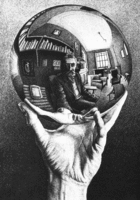 The things to do are: the things that need doing: that you see need to be done, and that no one else seems to see need to be done. Then you will conceive your own way of doing that which needs to be done -- that no one else has told you to do or how to do it. This will bring out the real you that often gets buried inside a character that has acquired a superficial array of behaviors induced or imposed by others on the individual. --Buckminster Fuller
I gotta quote that once in a while, as it is one of my favorites. The things to do are the things that need doing, that you see need to be done, and that no one else seems to see need to be done.
To me it implies that there's meaning in life. That we're here for something. That there's something unique and useful for us to do. It doesn't have to be taken that way. You can simply use it as a method for grabbing the opportunities with the most potential. The most satisfying kind of success is found in doing something needed, at the right time, which nobody else noticed was needed. There's not so much potential in just doing what everybody else is doing. No, see something different, and do something different. But do something that is needed.
We all seem to be different. From nature's hand we all have a little bit different DNA, different fingerprints. And then different experiences that have influenced us, different information we have absorbed. And including all that, and beyond all that, we each have a different consciousness, a different way of seeing things, a different perspective. It is only natural that we will see something nobody else is seeing, and we'll see things a different way than others. We're perceiving the world from a different point, using different filters than anybody else. And that is probably not just an accident, an error in the production machinery of nature. No, I don't think it is. It is a feature. It is by design. I'm inherently made up to see things differently and to do things differently than anybody else.
It is a bit of a waste if one just tries to do what everybody else is doing. A waste if one only learns to see things like one is "supposed" to. A waste of life. You're boring God, if you want to put it that way. There isn't a lot of use for billions of people who try to do the same thing the same way. It is counter-evolutionary. Short-circuiting the creative process of evolution. We've somehow accidentally created a society that tries to make us all do the same thing. It was a dumb idea. And it isn't going to work, because you just can't stop everybody from having a different perspective. There will always be somebody who sees something different and who acts on it.
There are lots of things that don't need doing, because they don't really add value. It is just like Information Theory. There isn't much information in "0000000000000001000000". There's just that one "1", and its position. Predictable information can be left out when data is transmitted, because it doesn't add meaning, it doesn't add value, it isn't information. Likewise, if you're just doing something that has already been done, in roughly the same way, you aren't adding value. You're wasting our time and yours. The net result is: not very much.
Imagine this reframe of the Information Society: the things that are valuable are those that add information.
A million copies of the same thing is adding no information, no value. It is valuable for somebody to record a new song, which others might find refreshing and enjoyable. A million copies of it add no value in itself. What the listeners might do with them might add value. Compare that with the music industry and arguments for or against file sharing. A new system of sharing adds value. The creative uses of information one has access to adds value. A carbon copy of any of it does not in itself add value. No information, no value.
So, imagine a society that really gets that. Where the value is in adding value. Duh. Economically speaking, I mean. Where the rewarding thing to do is the thing that adds information and value. I.e. you see something new, and you do something about it, and you share it.
We're headed there, I think. And there are well known fields that work pretty much like that. Open source, obviously. There's no point at all in making another piece of software that does exactly the same as another one, if the first one is freely available and modifiable. Might be smarter to look at how one can add value to what is already there, by adding something new, something different.
Lots of people doing what they see needs doing, is probably a very threatening prospect for certain groups, certain people in power positions. So many old structures are based on quite the opposite. I.e. persuading large groups of people to accept the perspective and the needed tasks of a very small group at the top. Here is the perspective you're supposed to have, here are the morals you need to adhere to, and here's your job. Which creates big machines that work, but only inefficiently. So everybody's running around and struggling to do what they're supposed to do. Where the system really could be so much more efficient and fun if we all could be active components, rather than passive. Most of us running on most of our cylinders most of the time. Because our inherent ability and tendency to see things differently and to add value is one of our key qualities. We're conscious players, who have the ability to create information and add value, indefinitely. We just have some unlearning to do, to get back to that.
So, what do you see that needs doing?
[ Inspiration | 2005-02-18 15:54 | | PermaLink ] More >
|
|
| Sunday, February 6, 2005 |  |
|
|
|
 It got a lot of press, but maybe you didn't hear about it. Two teenage girls living in rural Durango, Colorado decided one evening to bake cookies and deliver plates of them to their neighbors, decorated with hearts and friendly messages. They baked chocolate-chip and sugar cookies, and cut out big hearts from pink construction paper, and wrote "Have a Great Night!" on them. Just to be nice. Random act of kindness. Pay it forward. But one of those neighbors, who apparently is living in her own little strange world of terror, where everybody would be expected to attack her at any time, had a fit, thought somebody was going to break in and burglarize her, called the police, and generally got so upset that she checked herself into the hospital, thinking she was getting a heart attack from anxiety. Sounds like she's somebody who really could have used a plate of cookies and a friendly unthreatening message of kindness. But no, she then sued the two girls for her medical expenses and some judge agreed with her and ordered them to pay her $900. For delivering free cookies to her. So, if you ever had planned to do anything unexpectedly nice for Wanita Renea Young in Durango, you've better take her off your list! It got a lot of press, but maybe you didn't hear about it. Two teenage girls living in rural Durango, Colorado decided one evening to bake cookies and deliver plates of them to their neighbors, decorated with hearts and friendly messages. They baked chocolate-chip and sugar cookies, and cut out big hearts from pink construction paper, and wrote "Have a Great Night!" on them. Just to be nice. Random act of kindness. Pay it forward. But one of those neighbors, who apparently is living in her own little strange world of terror, where everybody would be expected to attack her at any time, had a fit, thought somebody was going to break in and burglarize her, called the police, and generally got so upset that she checked herself into the hospital, thinking she was getting a heart attack from anxiety. Sounds like she's somebody who really could have used a plate of cookies and a friendly unthreatening message of kindness. But no, she then sued the two girls for her medical expenses and some judge agreed with her and ordered them to pay her $900. For delivering free cookies to her. So, if you ever had planned to do anything unexpectedly nice for Wanita Renea Young in Durango, you've better take her off your list!
Now, this little event in itself might seem terribly unimportant for the world situation. And yet it was mentioned in most of the news outlets I normally look at. And I'm sure lots of people quote it and talk about it and pass it around. And that is what is fabulous. Almost anybody who hears the story will be outraged. It is unjust, unfair and mean what happened there. Sends a message that kindness isn't worth the trouble. But the uproar about it sends the opposite message. There's plenty of people in the world who think that kindness is a great thing, to be encouraged, rewarded, cultivated. The majority of people, really. So imagine for a moment a world where you can't get away with even the smallest injustice. You might get away with it at first, but your public reputation will forever keep a record of what you did. That's a great benefit of easily shared communication.
[ Inspiration | 2005-02-06 15:00 | | PermaLink ] More >
|
|
| Wednesday, November 24, 2004 |  |
|
|
|
 "A human being is a part of the whole, called by us "Universe," a part limited in time and space. He experiences himself, his thoughts and feelings as something separated from the rest - a kind of optical delusion of his consciousness. This delusion is a kind of prison for us, restricting us to our personal desires and to affection for a few persons nearest to us. Our task must be to free ourselves from this prison by widening our circle of compassion to embrace all living creatures and the whole of nature in its beauty. Nobody is able to achieve this completely, but the striving for such achievement is in itself a part of the liberation and a foundation for inner security."
-- Albert Einstein
[ Inspiration | 2004-11-24 18:26 | | PermaLink ] More >
|
|
| Thursday, November 4, 2004 |  |
|
|
|
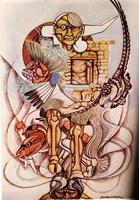 Via George Por, some Hopi wisdom that might be fitting at this moment: Via George Por, some Hopi wisdom that might be fitting at this moment:"You have been telling the people that this is the Eleventh Hour.
Now you must go back and tell the people that this is the Hour.
And there are things to be considered:
Where are you living?
What are you doing?
What are your relationships?
Are you in right relation?
Where is your water?
Know your garden.
It is time to speak your Truth.
Create your community.
Be good to each other.
And do not look outside yourself for the leader.
This could be a good time!
There is a river flowing now very fast.
It is so great and swift that there are those who will be afraid.
They will try to hold on to the shore.
They will feel they are being torn apart, and they will suffer greatly.
Know the river has its destination.
The elders say we must let go of the shore, push off into the middle of
the river, keep our eyes open, and our heads above the water.
See who is in there with you and celebrate.
At this time in history, we are to take nothing personally.
Least of all, ourselves.
For the moment that we do, our spiritual growth and journey comes to a
halt. The time of the lone wolf is over. Gather yourselves!
Banish the word struggle from your attitude and your vocabulary.
All that we do now must be done in a sacred manner and in celebration.
We are the ones we've been waiting for."
--The Elders, Oraibi, Arizona Hopi Nation"
[ Inspiration | 2004-11-04 11:08 | | PermaLink ] More >
|
|
| Monday, October 25, 2004 |  |
|
|
|
 My friend Edmond Cohen created a vision, iAmerica, for what ought to replace the World Trade Center in New York. I don't think it actually got submitted to the contest, and it is probably too late. Anyway, I hadn't looked at the latest version, even though it is hosted on my server. But I just saw it, and I think it is fabulous. Much more worthy than the mishmash that came out of the contest. A globe on top, lighted up by LEDs showing an image of the planet. Five domed biospheres on top of five surrounding towers. My friend Edmond Cohen created a vision, iAmerica, for what ought to replace the World Trade Center in New York. I don't think it actually got submitted to the contest, and it is probably too late. Anyway, I hadn't looked at the latest version, even though it is hosted on my server. But I just saw it, and I think it is fabulous. Much more worthy than the mishmash that came out of the contest. A globe on top, lighted up by LEDs showing an image of the planet. Five domed biospheres on top of five surrounding towers.
[ Inspiration | 2004-10-25 17:58 | | PermaLink ] More >
|
|
| Friday, October 1, 2004 |  |
|
|
|
 Via Vicky, a quote from Beth Johnson: Via Vicky, a quote from Beth Johnson:When things seem out of control remember that, indeed, they are. It is only the belief that you are ever in control that makes life seem to go awry. The harder you try to rule life, the harder it fights back. Learn to tell the difference between creating in the present and trying to control the future. One feels good, the other bad. It is quite telling that the people who try the hardest, or even who succeed the most in being in control, are people with personality disorders. Obsessive-compulsive neat-freaks and tyrants and dictators. Seems illogical and even counter-intuitive for us humans. Seems at first glance like it should be a great virtue to be in control of oneself and one's environment.
I suppose it still is, in a sense, but it is important to understand which kind of control is impossible, and which tends to drive us crazy. The quote points it out, for that matter. The time to create is in the present. The only thing you really have control over is what you do right now. And, sure, the better you can be aware of what exactly you're doing here in the present, and why you're doing it, and what you're trying to do, the better you'll probably do.
But you have no real control over what happens in the future. If you do things well in the present you have a whole lot of say as to what directions things go in. But you don't control what actually happens in the future. You might control what direction you're pointed in in the present, but you don't control what exactly happens, and you don't have direct control over where you end up.
You don't control the past either. A lot of our baggage relates to that we're trying to wish the past into being something different than what it was. Our regrets and failures. The things we should have done differently. The actions or results we feel ashamed of. You can't really change any of it. But you CAN change what you feel about it now, what you will learn from the past, and what you actually do right now, and how you create what you want now.
You don't control other people. You can influence them, inspire them, help them, guide them, threaten them, whatever. But if you think you actually directly can control them and their thoughts and emotions and actions, then you're probably a bit psycho. What they actually feel like doing is outside your realm of control.
It is one of those paradoxical things. You of course CAN influence others, and make things happen that you'd like to happen. But the catch is that you can only do that by what you do right here in the present moment. You can be knowledgable and perceptive and do the very best you can. And the better you are at it, the more likely it is that you'll create something like what you had in mind. But you're not in control of it.
And, yes, it feels good to do what we know how to do, what we like to do, what we feel is right right now. And all the other things we try to control typically feel bad. They're the causes of stress. Trying to make sure a certain outcome is guaranteed. Worrying about what other people will think and do. Worrying about what we might have done wrong, or what we might have forgotten about in the past. Worrying about what we might have failed to predict, or what we're failing to predict right now. We might feel it is necessary, but generally those things feel bad and stressful.
What makes it all harder is that our society seems to be structured so as to demand of us to be in control of both our past and future. We will be blamed for the things we do wrong, and for our failure to predict and control what happened. Our lives are full of commitments and accountabilities we can't easily opt out of. You need to pay the rent next month, of course. Your kids need to go to school, of course. You need to have done your taxes right, of course. You needed to have had the right permission to remodel your house. If you do the wrong thing, or say the wrong thing, or don't say the right thing, other people might be very upset with you. There are many things that could ruin your career or your reputation if you do them, or don't do them, or you hide them, or you don't hide them. Most of those things aren't here right now, and don't really have much to do with what you're inspired to be doing right now. But any of them can pop up and bite you at any time, and if you screw them up, everybody can easily agree on what a big idiot you are. So it seems like you have to always try to control all of these factors. Most of which you don't really control.
If we were just living from day to day on a south sea island without an economy, picking fruit off the trees when we were hungry, sleeping when we were sleepy, it would seem much easier. Nothing much to worry about, other than what is here right now. But that isn't how most of of live now. And even if you packed up and moved to Tonga, it probably wouldn't work like that today.
So, is it practical, or is it just a cool self-help thing to tell people to make them not be so stressed?
Well, it is first of all an awareness, I think. Know the difference between what you control and what you don't control. As to the stuff you DO control, try to do it as masterfully and deliberately as you can. Don't wait for somebody else to come and do your part. And for the part which you don't control, relax and be prepared for any outcome. Don't be attached to any one particular outcome. Doesn't mean you can't have preferences, and do certain things to make the more desirable things happen. Just means, do your part, but then let go, and don't be attached to outcomes. Know when your part stops, and it is up to the universe and to other people and to luck to make things happen from there on.
Isn't just a motivational thing to day. I'd say it reveals a key principle in how the universe works. And it provides one of the keys to happiness and success. And it also reveals another of our mental fallacies. I.e. ways we use our abstract thinking faculties to screw ourselves up, because we don't understand them well, and we confuse our thoughts about things with the things themselves.
[ Inspiration | 2004-10-01 15:38 | | PermaLink ] More >
|
|
| Thursday, September 9, 2004 |  |
|
|
|
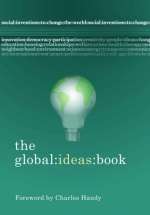 The yearly awards winners were announced by the Institute for Social Inventions last week in London. You know, for years the institute has collected innovative ideas for many kinds of social change. The ideas appear on the Global Ideas Bank website, and the best ones are published in at least one book every year. And of those, a few are chosen every year to get awards. And there's 1000 pounds for one of them. I just received the book of this year's ideas in the mail. And, well, we go way back. Not just because I was one of those awards winners quite a few years ago. But also because I was very involved in getting the website up originally, and getting the yearly ideas imported into it for years. And because Nicholas Albery who was the driving force behind the institute and the ideas bank became a good friend. Alas, he departed a little too soon, but good people are carrying on the institute, and clever and entertaining ideas are still streaming in. The yearly awards winners were announced by the Institute for Social Inventions last week in London. You know, for years the institute has collected innovative ideas for many kinds of social change. The ideas appear on the Global Ideas Bank website, and the best ones are published in at least one book every year. And of those, a few are chosen every year to get awards. And there's 1000 pounds for one of them. I just received the book of this year's ideas in the mail. And, well, we go way back. Not just because I was one of those awards winners quite a few years ago. But also because I was very involved in getting the website up originally, and getting the yearly ideas imported into it for years. And because Nicholas Albery who was the driving force behind the institute and the ideas bank became a good friend. Alas, he departed a little too soon, but good people are carrying on the institute, and clever and entertaining ideas are still streaming in.
A couple of the awards from this year: The £1,000 Overall Social Innovations Award for 2004 goes to Mahabir Pun, a teacher whose dedication and imagination has brought the internet and telecommunications to some of the remotest communities in the world in Nepal. Using an inspired mix of solar power, tree-based relay systems and wireless technology, the project is helping yak farmers stay in touch, families communicate and, with an expansion into distance learning, children to gain education. See NepalWireless.net for more information.
The Environmental Social Innovations Award for 2004 goes to Kerry Channing, an IT consultant from Brighton, who proposes a footprint or profile for products to allow people to make ethical choices between them. Products would be assessed on their fairness (to workers), their sustainability (can they be recycled, what impact they have) and their health (do they affect the health of humanity or the environment?). In this way, an 'IQ' would be created, allowing for greater transparency in the retail market, and greater choice for consumers. For further information, see the EIQ Profile Those are good projects and ideas. But if you think them a little too serious, check out some of the other clever and funny ideas in the bank that are maybe less likely to happen, like the suggestion to Miniaturise Humans by genetic engineering, in order to save greatly on our resource use. You know, if we were only 50cm tall, we'd consume 1/8 as much food, and would need much less room and smaller cars, etc. Makes a lot of sense, actually, but who's gonna start?
There's a Global Ideas Blog too, passing on a lot of stimulating creativity.
[ Inspiration | 2004-09-09 19:14 | | PermaLink ] More >
|
|
|
|
 Ned Hamson passed on a mention of a new book by Parker Palmer: A Hidden Wholeness. I haven't heard of him, or read his previous books, but various snippets in the blurbs about them speak to me, and to something I just happened to be thinking about at the moment. You know, how to just be yourself and follow your own calling. So, here are some things others are saying about the man's writings: Ned Hamson passed on a mention of a new book by Parker Palmer: A Hidden Wholeness. I haven't heard of him, or read his previous books, but various snippets in the blurbs about them speak to me, and to something I just happened to be thinking about at the moment. You know, how to just be yourself and follow your own calling. So, here are some things others are saying about the man's writings:The old Quaker adage, "Let your life speak," spoke to author Parker J. Palmer when he was in his early 30s. It summoned him to a higher purpose, so he decided that henceforth he would live a nobler life. "I lined up the most elevated ideals I could find and set out to achieve them," he writes. "The results were rarely admirable, often laughable, and sometimes grotesque.... I had simply found a 'noble' way of living a life that was not my own, a life spent imitating heroes instead of listening to my heart."
Thirty years later, Palmer now understands that learning to let his life speak means "living the life that wants to live in me." It involves creating the kind of quiet, trusting conditions that allow a soul to speak its truth. It also means tuning out the noisy preconceived ideas about what a vocation should and shouldn't be so that we can better hear the call of our wild souls. ...
Palmer seeks to help us "rejoin soul and role," so that individuals and communities can be healed from the ravages of consumerism, injustice and violence. No small task, yet in classic Palmer style, this mission is fleshed out with stories, poems, personal confessions and a plan--concrete steps for creating "circles of trust" where honest, open sharing allows each person's "inner teacher" to show up. (Ground rules: "no fixing, no saving, no advising, no setting each other straight.") Palmer's concern is that too many people have "divided lives," with personal values that don't match what they are asked to do in the world to succeed. ...
Never naive, Palmer warns that these "circles of trust" are not management tools that organizations can force on employees for some grand motive, such as crisis control or increased productivity. They are the opposite of quick fixes--places where we sit and wait for our souls to tell the truth. ...
Here he speaks to our yearning to live undivided lives--lives that are congruent with our inner truth--in a world filled with the forces of fragmentation. ...
This is a personal, human, moving, insightful, practical work on the discovery of True Will, and living life in conformity with it. ... and some quotes from what he actually wrote himself:"Before you tell your life what you intend to do with it, listen for what it intends to do with you. Before you tell your life what truths and values you have decided to live up to, let your life tell you what truths you embody, what values you represent."
"True self, when violated, will always resist us, sometimes at great cost, holding our lives in check until we honor its truth."
"...self-care is never a selfish act - it is simply good stewardship of the only gift I have, the gift I was put on earth to offer to others."
"The attempt to live by the reality of our own nature, which means our limits as well as our potentials, is a profoundly moral regimen."
"One dwells with God by being faithful to one's nature. One crosses God by trying to be something one is not. Reality - including one's own - is divine, to be not defied but honored." And, yes, it is about finding "the place where our deep gladness meets the world's deep need". Yes, I don't doubt it. There's a magic that is available by simultaneously connecting with what we're most inspired to do and what we notice most is needed in the world. And probably finding that they're one and the same thing. Every human being is very much needed in the world, and when we discover what we're needed for, and how exciting we find that to be, life has meaning. And we might live it undivided.
[ Inspiration | 2004-09-09 11:52 | | PermaLink ] More >
|
|
| Friday, July 2, 2004 |  |
|
|
|
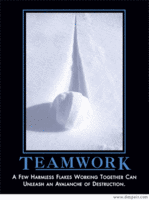 I love these posters from Despair.inc. They pretend to be a cynic anti-thesis to those motivational posters many companies have hanging around. But these are so cleverly written that they're really only cynic at the first glance, but when you actually grok them, they're really much more inspiring and motivating than the "real" thing. I love these posters from Despair.inc. They pretend to be a cynic anti-thesis to those motivational posters many companies have hanging around. But these are so cleverly written that they're really only cynic at the first glance, but when you actually grok them, they're really much more inspiring and motivating than the "real" thing.
[ Inspiration | 2004-07-02 15:20 | | PermaLink ] More >
|
|
| Wednesday, June 9, 2004 |  |
|
|
|
 Via and from Dave Pollard. This week's That's Awfully Personal question: Via and from Dave Pollard. This week's That's Awfully Personal question: Q: You wake up in a strange new world where everyone gets paid the same salary no matter what they do for a living, even if there's no obvious 'market' for it, and no matter how many hours a week they work at it. And everything costs 'whatever you can afford'. What would you do for a living? Is this something you're already good at, or something you'd like to *become* good at? What kind of people would you like to work with, or would you prefer to work alone? And what would you do with your new-found leisure time? Absolutely fabulous question. Here's Dave's answer: A: For a living, I'd study and report on the languages of other animals, so that ultimately we could learn to talk to them, and learn from them (more than we do already). I have some skills that would help: Strong analystical and problem-solving ability, creativity and communication skills. But I'd need to study linguistics, to be a better listener, and to pay more attention to detail. I'd like the project to be self-managed, and the team working on it to be self-selected (that means we would pick each other, not that I would pick the team). My spare time would still be spent as it is now -- writing -- though I would probably also spend more time talking with, perhaps in a teaching/coaching (but not lecturing) capacity, young people. Now my turn. Hm, what would I want to do for a living? I'm not sure I'd consider it something to do for a living if I would be paid the same no matter what. I'd no longer do it for something, at least in the sense of buying myself something in exchange. I'd maybe do it towards something. But basically it would be doing what I want. And I happen to like things that have some kind of point to it, even if convoluted and complex.
So, honestly, what would I do .... hm ... I'd take my time first of all. I'd spend a few months reading. I'm way behind on studying things I don't know. I could have a much better foundation for doing something useful if I were better prepared rather than mostly winging it.
Then I'd pick some new fields to learn. Japanese sword fighting, maybe. What has worked well for me in the past is to learn new fields, particularly in areas where I was a bit uncomfortable or clumsy. Public speaking, acting, singing. So I'll find some new areas of learning that I maybe wouldn't even have thought of. Exploring caves, dancing. I always draw good energy and inspiration from covering previously unknown ground, which transfers to everything else I do.
I would write more, and spend more time thinking about things. And, for sure, inspirations will come up for something I just have to do. Something I see that needs doing, and that I'm burning to do something about. It works best for me when it is as non-planned as possible. I.e. I haven't promised anybody I would do it, and I haven't committed to any kind of schedule. Preferably I just start spending my evenings doing something that nobody expects. I can thus concentrate on doing it as well as necessary, however long it takes, without worrying whether anybody's happy with my performance or not.
I'd want to spend more time in conversations as well. Dialogues. Exploration of what is there to talk about, wherever it leads. I'll avoid the temptation to too quickly commit to action. But when it is really obvious that action needs to be taken, and the right people are there, I'll enjoy the freedom to get to work right away.
The things I'd probably want to do are likely to have something to do with personal or group organization, collaboration, communication, evolution of wisdom, or with mental/emotional/metaphysical tools for better living. But I'd hope to avoid having very many pre-conceived ideas about what it should be, and rather be ready to discover it when it emerges.
[ Inspiration | 2004-06-09 05:18 | | PermaLink ] More >
|
|
| Monday, May 31, 2004 |  |
|
|
|
Via Empowerment Illustrated:According to Andrew Cohen ... the most important question you can ask yourself is 'What would you do if you knew that you would die tomorrow?' The answer is that you would want to unburden yourself of feelings of guilt and shame. You would want to become transparent to loved ones and to god. And there are many cases of dying people doing this very movingly. The next question is 'why not start doing it now?' The ego hates the idea of doing this and will avoid it right up to the moment of physical death. And overcoming the ego is the only way to liberate the authentic self and experience the energy of evolutionary enlightenment. Yeah, the things to do today are probably the things you would rush out doing if you knew you would die tomorrow. The mental and emotional exercise of considering what that would be, brings out what is really important. For most people it brings up who you need to tell that you love them. Things you need to apologize for. Somebody you need to be present with, without worrying about what they've been or what they should do or what you should do.
[ Inspiration | 2004-05-31 05:48 | | PermaLink ] More >
|
|
| Saturday, May 22, 2004 |  |
|
|
|
 Mentioned on Empowerment Illustrated, I'm looking at the EQnomy Manifesto. It is based on the idea that all human action is rooted in emotion, and the aim is that we can live consciously, in tune with others, and aiming at happiness for everyone. Here are its 12 Theses: Mentioned on Empowerment Illustrated, I'm looking at the EQnomy Manifesto. It is based on the idea that all human action is rooted in emotion, and the aim is that we can live consciously, in tune with others, and aiming at happiness for everyone. Here are its 12 Theses:
1. People want to experience that they live. Now.
2. The truly important things are: being-human, development, challenge and fun!
3. People define their own passion, energy, success and needs.
4. Our EQnomy is a sizzling party of real, authentic human beings.
5. We seek no 'balance between work and personal life'; we are our authentic selves in work and in private.
6. Our talents, time, attention, ideas, knowledge and networks are ours and our responsibility.
7. An organization is not a Counsel, Company, Care- or Educational Institution. An organization always consists of PEOPLE who are committed to each other and to other people.
8. "What does your care, involvement, service or product add to me, my development, challenge and fun!?"
9. We do not want to be 'robbed'; we want to be 'touched'.
10. Before we go along with an organization, we first want to understand it and feel it; the mission, the culture; the people.
11. We are loyal to the passion and inspiration with which all once began. Not to the rules that 'crept in' along the way.
12. To us it is not about WHAT we do. To us it is about WHY we do what we do. That is an intriguing angle to take on everything. Life is about being alive, about being true to who we are. Any kind of organization and set of rules are of course secondary to the authenticity of what we're about, what life is about. If you're a different person at work than when you're "off", you're not being real.
Yes, imagine how life would be if we could live it authentically all the time, and we could allow others the same freedom, and we didn't feel compelled to force ourselves and others into some fake roles, pursuing aims than none of us really care about.
[ Inspiration | 2004-05-22 07:48 | | PermaLink ] More >
|
|
| Wednesday, May 5, 2004 |  |
|
|
|
 A reminder from Dina. The Sounds of Silence: A reminder from Dina. The Sounds of Silence:"And in the naked light I saw
ten thousand people, maybe more.
People talking without speaking,
people hearing without listening.
People writing songs
that voices never shared,
no one dared disturb
the sound of silence.
Fools, said I, you do not know,
silence like a cancer grows.
Hear my words that I might teach you,
take my arms that I might reach you.
But my words like silent raindrops fell
and echoed in the wells of silence"
Listen. Instead of falling prey
to our neon Gods.
[ Inspiration | 2004-05-05 17:38 | | PermaLink ] More >
|
|
| Tuesday, April 27, 2004 |  |
|
|
|
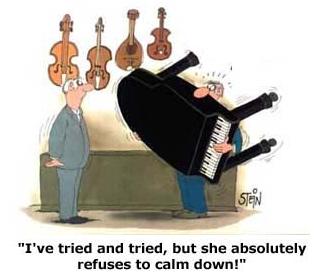 I like randomly generated content. Particularly I like when various kinds of content are combined somewhat randomly, and unexpected and synchronistic results can be seen. Well, not just ANY content, but sometimes it really works. I like randomly generated content. Particularly I like when various kinds of content are combined somewhat randomly, and unexpected and synchronistic results can be seen. Well, not just ANY content, but sometimes it really works.
This site took a few hundred joke comics and separated the text from the pictures, and then put them together randomly each time you load their page. The results are surprisingly meaningful.
Via BoingBoing
[ Inspiration | 2004-04-27 09:36 | 0 comments | PermaLink ]
|
|
| Friday, April 23, 2004 |  |
|
|
|
 Last Friday while in London with Max, we dropped by the offices of the Institute for Social Inventions, the people behind the Global Ideas Bank, the most prolific and well-known grassroots idea gathering organization. We've had a relation since 1995. I put all their books online and set up a voting system so people could rate new and old ideas, and see what others had rated well. And the site was hosted first on Max's server for a couple of years, and then I've been providing it a home since then. But I didn't always have time to devote to new programming and improvements. So now it is in new hands, and today they're launching a re-designed site. It has a new, more modern look, and it has all the same functionality, plus a range of new facilities. Last Friday while in London with Max, we dropped by the offices of the Institute for Social Inventions, the people behind the Global Ideas Bank, the most prolific and well-known grassroots idea gathering organization. We've had a relation since 1995. I put all their books online and set up a voting system so people could rate new and old ideas, and see what others had rated well. And the site was hosted first on Max's server for a couple of years, and then I've been providing it a home since then. But I didn't always have time to devote to new programming and improvements. So now it is in new hands, and today they're launching a re-designed site. It has a new, more modern look, and it has all the same functionality, plus a range of new facilities.
The Institute for Social Inventions was the brainchild of Nicholas Albery whom I had the pleasure of working with frequently on issues around the GIB site. He unfortunately died suddenly almost three years ago, but the work is carried on by other good people. Today under the umbrella of the Nicholas Albery Foundation. There are luckily promiment supporters who will help it carry on its work, like Anita Roddick and Brian Eno.
[ Inspiration | 2004-04-23 10:45 | | PermaLink ] More >
|
|
| Thursday, April 22, 2004 |  |
|
|
|
 Max points to the Institute for the Study of Peak States, which of particular interest has an interesting list of peak states, categorized in various ways, and marked according to their probablity of occuring in the general population. Stuff like: Max points to the Institute for the Study of Peak States, which of particular interest has an interesting list of peak states, categorized in various ways, and marked according to their probablity of occuring in the general population. Stuff like:'Underlying Happiness' state
• Characteristics: A feeling of happiness underlies all other feelings. It exists simultaneously even with difficult feelings such as sadness or anger. In women, a continuous loving feeling is more dominant, although the happiness is still present.
• Cause: Heart and body brains fused together.
• Comment: Doesn't stop the past from feeling emotionally traumatic.
• Frequency: Estimated 9% relatively continuously, additional 12% recognize it.
'Big Sky' state
• Characteristics: The world feels huge. Looking at the sky, it feels gigantic. Your boundaries disappear, especially above your head.
• Cause: Body, mind and Buddha brains fused together. The sensation of the huge sky is from a body sensation of the relative distance between objects and one's body.
• Comment: I'm not sure if I've accurately analyzed this state. Treat it as possibly being due to some other phenomenon. More work needs to be done on it.
• Frequency: Not determined.
'Brains Communicate' state
• Characteristics: The three brains can communicate with each other. Brains interact like a dysfunctional family.
• Cause: All the brains' awarenesses are touching and in communication.
• Comment: A useful intermediate state, but not as valuable or dramatic as a fused one. In a Perry diagram, the circles all overlap slightly.
• Frequency: Estimated 12% relatively continuously, additional 23% recognize it.
'Deep Peace' state
• Characteristics: Deeper peaceful feeling than the Beauty Way. A feeling of being balanced, evenness, no irritation. Feels like the physical heart is lower in the body. Feel more lightweight. Not effortless, but not as bad as normal consciousness. Brains are aware of each other, can communicate directly, and you are aware of each simultaneously.
• Cause: Brains' awarenesses are superimposed, but not completely fused. No hollow sensations in the body.
• Comment: An intermediate state that we don't try to get.
• Frequency: Not determined.
'Hollow' state
• Characteristics: Body feels hollow inside the skin. All parts of the body feel 'continuous'. Emotions have a cognitive rather than affective quality.
• Cause: All brains fuse together.
• Comment: Chakras are not merged. Brains are not connected to the Realm of the Shaman.
• Frequency: Estimated 7% relatively continuously, additional 12% recognize it.
'Wholeness' state
• Characteristics: The word 'wholeness' is the most accurate for this state, and is used spontaneously by people acquiring it. A feeling of being complete, with nothing missing. Music is especially vivid.
• Cause: A fusion of the placental and sperm tail 'energy' or 'awarenesses' with the other triune brains.
• Comment: The sensation of wholeness exists independently of the state of fusion of the other brains.
• Frequency: Not determined. Well, I do recognize some of those. Anyway, they seem to be aiming for ways of allowing people to spend more time in such peak states. Which would be splendid, of course.
[ Inspiration | 2004-04-22 10:41 | | PermaLink ] More >
|
|
| Monday, April 19, 2004 |  |
|
|
|
 Via Local Thoughts, a little creative exercise: Via Local Thoughts, a little creative exercise:1. Grab the nearest book
2. Open the book on page 23.
3. Find the fifth sentence.
4. Post the text of the sentence in your journal along with these instructions.
The nearest book I grabbed blindly from the shelf was the Webster's College Dictionary. Now, I'm not sure if in this case I should pick literally the 5th sentence or the 5th word defined. But, magically, they're talking about the same thing. 5th sentence is part of the definition of "affluence":a flowing to or toward some point; afflux. And the 5th word defined is "afflux", which means:1. something that flows to or toward a point, e.g. "an afflux of blood to the head". 2. the act of flowing to or toward some point. So, afflux or affluence is when something flows towards a point. If you want an affluence of something, you need to make it flow towards a point. That's sort of simple and basic, but a very useful thing to pay attention to. If I want an affluence of money, money needs to be flowing towards a point, such as my bank account.
[ Inspiration | 2004-04-19 12:25 | | PermaLink ] More >
|
|
<< Newer stories Page: 1 2 3 4 5 6 7 8 9 Older stories >> |

